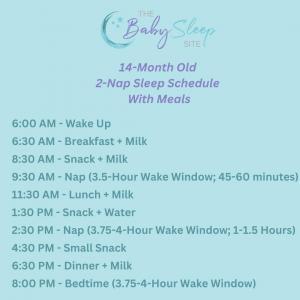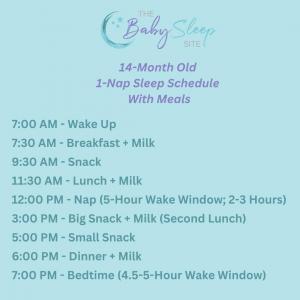14 Month Old Sleep Schedule: Bedtime, How Many Naps, and How to Get Your Toddler to Sleep Through the Night

The right 14 month old sleep schedule can help your toddler sleep through the night and take longer naps. However, many toddlers this age are starting to drop their naps and their schedule isn’t clear-cut. This article will share everything you need to know about your 14 month old’s sleep schedule to help them sleep longer and be happier!
In this article:
- How Much Sleep 14 Month Olds Need
- 14 Month Old Sleep Schedule Wake Windows and Awake Time
- Sample 14 Month Old Sleep Schedules
- Why 14 Month Olds Wake Up Too Early
- Why 14 Month Olds Wake Up at Night and Can I Do Sleep Training?
- 14 Month Old Sleep Schedule FAQ
How Much Sleep 14 Month Olds Need
Most 14 month old toddlers need 12-14 hours of sleep per day including 10-12 hours at night and 2-3 hours during the day. At this age, toddlers are sleeping through the night and taking 1-3-hour naps.
Of course, many toddlers will need more or less than the average amount of sleep. So, if your toddler is sleeping more or less than 13-14 hours in a 24-hour period, if they’re happy, it’s more than likely just fine. The best way to know if your toddler is getting enough sleep is to look at their mood, behavior, and other signs of over-tiredness. Although tantrums are common, overtired babies tend to have more of them.
14 Month Old Sleep Schedule Wake Windows and Awake Time
For toddlers taking two naps, the wake windows for 14 month olds are usually 3.5 to 4 hours. Most 14 month olds can stay awake for at least 3.5 hours at a time though every child is unique. More specifically, we usually see these awake times:
- 3.5 hours before nap 1
- 3.75 to 4 hours before nap 2
- 4 hours before bedtime.
However, if your toddler has already dropped to one nap, awake time is usually 4.75 to 5 hours both before and after their nap.
How Many Naps Should a 14 Month Old Take?
Most 14 month olds take two naps but a good number are able to have 4- to 5-hour wake windows and ready to drop to one nap. The average age to transition to one nap is around 15 months, however, a common question is how many naps a 14 month old should take. In 15 years of being a sleep consultant, I’ve seen countless 14-month-olds drop to one nap. The best thing to do is wait to see signs of dropping to one nap before changing their sleep schedule because transitioning too early can cause night-waking and other sleep problems.
You May Also Be Interested In…
3 Ways to Transition From 2 Naps to 1 Nap – Find the Right Way For Your Toddler
What Time Should a 14 Month Old Go to Bed?
The most common bedtime for a 14 month old is 7:00 to 9:00 PM. If your toddler is still taking two naps, they likely need 10-11 hours of sleep at night. In that case, you want bedtime to be 8:00 PM or later. Otherwise, they will wake up too early the next morning.
If your toddler is experiencing insomnia by staying awake for long periods at night (also known as a split night), your bedtime is likely too early or it’s time to drop to one nap.
If your toddler has 4-hour wake windows all day, their bedtime might land closer to 9:00 PM. Depending on your lifestyle, this might work for your family or you might want to consider shortening one of their naps or transitioning to one nap.
Once you transition to one nap, you will want to strive for 11-12 hours of sleep at night so a 7:00 to 7:30 PM bedtime is great!
If your bedtime is earlier or later than the typical range, and sleep is good in your household, there is no need to change it.
Sample 14 Month Old Sleep Schedules
The right 14 month old sleep schedule can help your toddler sleep through the night, nap longer during the day, and be happier, overall. Use these sample schedules to help you find the right one for your unique situation.
Sample 2-Nap Sleep Schedule
This sample 2-nap schedule has typical wake windows of 3 to 4 hours:
| Time | Wake Window | Activity | Sleep Length |
| 6:00 AM | Wake* | ||
| 9:30 AM | 3.5 Hours | Nap | 45-60 minutes |
| 2:30 PM | 3.75-4 Hours | Nap | 1 to 1.5 hours |
| 8:00 PM | 3.75-4 Hours | Bedtime (Asleep by this time) |
10 to 11 hours |
* Should you wake your toddler? If you are struggling to stay on a 2-nap schedule and don’t feel your toddler is ready for a 1-nap schedule, yes, you should wake your child. Otherwise, your day starts to “squeeze” and you don’t have time for two naps.
Sample 2-Nap Sleep Schedule With Meals
When I’m working with clients via sleep training services, many parents want to know when they should offer meals especially if they’re having trouble night-weaning and getting their toddler to sleep through the night without milk. You’d be surprised how many times all I do is fix someone’s schedule to improve their sleep! Here is a sample sleep schedule with feedings for a 14 month old taking two naps:
| Time | Wake Window | Activity | Sleep Length |
| 6:00 AM | Wake* | ||
| 6:30 AM | Breakfast + Milk | ||
| 8:30 AM | Snack + Milk | ||
| 9:30 AM | 3.5 Hours | Nap | 45-60 minutes |
| 11:30 AM | Lunch + Milk | ||
| 1:30 PM | Snack + Water | ||
| 2:30 PM | 3.75 to 4 Hours | Nap | 1 to 1.5 hours |
| 4:30 PM | Small Snack | ||
| 6:30 PM | Dinner** + Milk | ||
| 8:00 PM | 3.75 to 4 Hours | Bedtime (Asleep by this time) |
10-11 hours |
* Should you wake your toddler? If you are struggling to stay on a 2-nap schedule and don’t feel your toddler is ready for a 1-nap schedule, yes, you should wake your child. Otherwise, your day starts to “squeeze” and you don’t have time for two naps.
** Why Is Dinner So Late? One very important aspect of your schedule is to ensure your toddler does not wake up too early due to hunger. If you are offering dinner at 5:00 PM, you could battle a 5:00 AM wake-up (~12 hours after dinner irrespective of bedtime). This is also a common age to stop giving milk at bedtime if you haven’t stopped already.

Sample 1-Nap Sleep Schedule
In my 15+ years of experience as a sleep consultant, I’ve seen many 13-14-month olds transition to one nap. Therefore, I wanted to include sample 1-nap schedules, too. Keep in mind that if your toddler takes “just” a 2-hour nap (which is completely normal), you will want to stick to 5-hour wake windows and strive for a 12-hour night. However, if your child takes a 2.5 to 3-hour nap, you can offer a 4 to 4.5-hour wake window before their nap with 4.5 to 5 hours awake time before bedtime. It depends on how much sleep your toddler needs in total.
| Time | Wake Window | Activity | Sleep Length |
| 6:30 AM | Wake* | ||
| 11:30 AM | 5 Hours | Nap | 2 to 3 hours |
| 6:30 PM | 5 Hours | Bedtime (Asleep by this time) |
11 to 12 hours |
* Should You Wake Your Toddler? On a 1-nap schedule, there isn’t as much of a need to wake your toddler and you can usually let them sleep. However, if your toddler is routinely sleeping longer than 12 hours at night and taking short naps, you may want to limit nighttime sleep to “leave some” for the daytime. Their total sleep will stay relatively constant so some toddlers can sleep “too much” during the day or night which negatively impacts the other.
Sample 1-Nap Sleep Schedule With Meals
Again, many clients want to know how to fit meals in to set up their toddler for success in sleeping through the night and taking long, luxurious naps. Here’s a typical 1-nap schedule with meals:
| Time | Wake Window | Activity | Sleep Length |
| 6:30 AM | Wake* | ||
| 7:00 AM | Breakfast + Milk | ||
| 9:00 AM | Snack | ||
| 11:00 AM | Lunch + Milk | ||
| 11:30 AM | 5 Hours | Nap | 2.5 to 3 hours |
| 3:00 PM | Big Snack + Milk (Second Lunch) |
||
| 5:00 PM | Small Snack | ||
| 6:00 PM | Dinner + Milk | ||
| 7:00 PM | 4.5-5 Hours | Bedtime (Asleep by this time) |
11 to 12 hours |
* Should You Wake Your Toddler? On a 1-nap schedule, there isn’t as much of a need to wake your toddler and you can usually let them sleep. However, if your toddler is routinely sleeping longer than 12 hours at night and taking short naps, you may want to limit nighttime sleep to “leave some” for the daytime. Their total sleep will stay relatively constant so some toddlers can sleep “too much” during the day or night which negatively impacts the other.

Sample Toddler Schedules By Month For All Ages
Did you know we have sample toddler schedules by month for all ages? Check it out!
Why Some 14 Month Olds Wake Up Too Early
If your 14 month old is waking up too early in the morning, there are a few common reasons:
- Dropping to One Nap – If your toddler is sleeping less than 10 hours at night, they might be ready for a 1-nap schedule. If they are sleeping 10 hours at night but happily taking two naps AND waking up before 6:00 AM, simply shift their schedule forward by at least an hour.
- Overtiredness at Bedtime – If their afternoon nap is shorter or their wake window is too long before bedtime, this is the #1 reason for waking up too early the next day. Shorten the wake window right before bedtime. If your toddler wakes up crying, this is the most likely reason.
- Hunger – As I mentioned above, if you offer dinner too early, this is a common reason for waking up too early. This is especially true if your toddler has at least two hours to burn off dinner before bedtime.
- Sunrise – We are meant to rise with the sun and go to sleep with the sunset. Unnatural light has made all of our bedtimes later than natural. Children who are sensitive to light could wake up too early when the sun starts to shine through their windows. Consider room-darkening shades, blinds, or curtains.
Although there are a few other reasons your toddler could be waking up too early, these are the most common culprits.
Why Some 14 Month Olds Wake Up at Night and Can You Do Sleep Training?
There could be many reasons causing your toddler to wake up at night. While you can do sleep training, that doesn’t fix every cause. Be sure to solve the right problem and check out our article Top 15 Reasons Your Baby Is Waking at Night. Keep in mind that if your toddler has insomnia (aka split night), this is a big sign it’s probably time to transition to one nap!
14 Month Old Sleep Schedule FAQ
No, it is not too early for one nap but make sure your toddler is ready for 4.5 to 5-hour wake windows. If your toddler’s awake time is still 3 to 3.5 hours before the morning nap, it’s probably too early for one nap.
14 month olds nap for 2 to 3 hours total every day whether it’s in one nap or two naps.
Most 14 month olds are still taking two naps but many toddlers are ready to drop to one nap if their awake time is at least 4 hours long.
Daytime sleep for 14 month olds should total 2 to 3 hours.
A typical bedtime for a 14 month old is between 7:00 to 8:00 PM if they are taking one nap and between 7:00 and 9:00 PM if they are still taking two naps.
If you recently transitioned to one nap, the most likely reason your 14 month old is waking up crying every night is that bedtime is too late. Move bedtime earlier by 20-30 minutes to see if it improves.
The average age to transition from crib to toddler bed is 3 to 4 years old so we highly recommend you keep your 14 month old in a crib. Be sure to read When and how to Transition from Crib to Toddler Bed.
No, there is typically NOT a 14 month sleep regression. More than likely, your toddler is changing their sleep schedule which might appear like a sleep regression. Insomnia, for example, is a sure-fire sign it’s time to drop to one nap.
There could be many reasons your toddler is waking up at night. While you can do sleep training, that doesn’t fix every reason. Solve the right problem! And, be sure to check out our article Top 15 Reasons Your Baby Is Waking at Night. Keep in mind that if your toddler has insomnia (aka split night), this is a big sign it’s probably time to transition to one nap!
Toddlers should drink 16-20 oz of milk per day until they are 5 years old according to the American Academy of Pediatrics. Although cow’s milk is the most common, there are many options nowadays. The type of milk you offer should have a minimum of 8 grams of protein per serving so be careful about milk substitutes and the amount of sugar.
The post 14 Month Old Sleep Schedule: Bedtime, How Many Naps, and How to Get Your Toddler to Sleep Through the Night appeared first on The Baby Sleep Site – Baby / Toddler Sleep Consultants.




